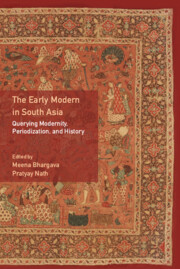11 - Was Mughal Warfare Early Modern?
Published online by Cambridge University Press: 06 September 2022
Summary
It has become increasingly commonplace in the last two decades to refer to the Mughal Empire as an early modern polity. By extension, Mughal warfare too gets designated as early modern. But what does it really mean for Mughal warfare to be early modern? Is it simply because it is associated with a certain historical period that has now been re-categorized and redefined? Or did this warfare exhibit certain features that actually set it apart from those of earlier and later times, thereby necessitating the use of a new temporal category? If that indeed is the case, then what features might these be? The present chapter addresses these questions.
The first section discusses how historians have looked at Mughal warfare in relation with the historical evolution of military processes in the Indian subcontinent. These discussions have been dominated by an emphasis on the role of a single technology – gunpowder weaponry – and a single explanatory framework – the Military Revolution hypothesis. I argue that much of this has been a Eurocentric exercise, whereby historians have assessed South Asian warfare using parameters drawn from the European historical experience. For some, this has created the problematic impression of drastic change – a historical break – brought about by the proliferation of gunpowder weaponry in the sixteenth century. For others, it has created an equally debatable notion of military changelessness between the eleventh century and the eighteenth. Moving away from both these interpretations, the present chapter analyses Mughal warfare on its own terms and in the specific historical context of South Asia. I explore four major facets of Mughal warfare in four subsequent sections – military adaptation, army organization, management of war, and culture of war. I argue that in all these fields, Mughal warfare ushered in a new paradigm that should be called early modern because of the considerable shift it marked away from its antecedents. It was only since the mid-eighteenth century that this military early modernity was derailed in a large measure by the onset of colonial modernity.
Warfare, Revolutions, and the Search for a Military Early Modernity
There are two strands of thought that see the rise of Mughal power as a major military shift in South Asia. First, one idea that emerged in course of the 1970s and 1980s was that of the Mughal polity being a ‘gunpowder empire’.
- Type
- Chapter
- Information
- The Early Modern in South AsiaQuerying Modernity, Periodization, and History, pp. 224 - 246Publisher: Cambridge University PressPrint publication year: 2023

